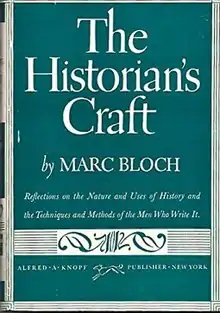The Historian's Craft
The Historian's Craft (French: Apologie pour l'histoire ou Métier d'historien) is a 1949 book by Marc Bloch and first published in English in 1953 (New York: Knopf). It was the first of his works to be translated into English.[1] At that stage he was not as well known in the English-speaking world as he was to be in the 1960s where his works on feudal society and rural history were published. The book was written in 1941 and 1942. Bloch joined the French Resistance prior to its completion.

Content
The work explores the craft of the historian from a number of different angles and discusses what constitutes history and how it should be configured and created in literary form by the historian. The scope of the work is broad across space and time: in one chapter, for instance, he cites a number of examples of erroneous history-writing and forgeries, citing sources as wide-ranging as the Commentaries of Julius Caesar and the Protocols of the Elders of Zion. His approach is one that is configured not for those who are necessarily professional historians themselves (members of what he referred to as "the guild") but instead for all interested readers and non-specialists.[2]
Bloch also expressed the viewpoint that the craft of the historian should not be a judgmental one – that the historian should attempt to explain and describe rather than evaluate in normative terms.[3] At one stage in the work, Bloch observes that "the mania for making judgments" is a "satanic enemy of true history".[4]
Reaction
The Historian's Craft has been described as unrepresentative of his historical approach in that they discuss contemporary events in which Bloch was personally involved and without access to primary sources.[5] Along with the unfinished Strange Defeat, it was published posthumously in 1949.[5][6] The historian Rees Davies has described The Historian's Craft as "beautifully sensitive and profound";[7]: 265 the book was written in response to his son, Étienne, asking, "Tell me, Daddy. What is the use of history?".[8][9] Addressing fellow historian and close friend Lucien Febvre "by way of a dedication", Bloch wrote:[10]
Long have we worked together for a wider and more human history. Today our common task is threatened. Not by our fault. We are vanquished, for a moment, by an unjust destiny. But the time will come, I feel sure, when our collaboration can again be made public, and again be free. Meanwhile, it is in these pages filled with your presence that, for my part, our joint work goes on.
— Marc Bloch, The Historian's Craft, Dedication
References
- Spang, Rebecca. "Marc Bloch: His Life and Legacy". Project Muse. Retrieved 4 July 2014.
- Bloch, Marc (1992). The Historian's Craft. Manchester University Press. p. xiv. ISBN 071903292X. Retrieved 4 July 2014.
- Edgar, Harry. "Book Review 132: The Historian's Craft". The Maui News. Archived from the original on 14 Jul 2014. Retrieved 25 March 2022.
- Ghegoiu, Silviu. "Essay on Marc Bloch's The Historian's Craft". Academia.edu. Archived from the original on 27 Nov 2014. Retrieved 25 March 2022.
- Stirling, K. (2007). "Rereading Marc Bloch: The Life and Works of a Visionary Modernist". History Compass. 5 (2): 525–538. doi:10.1111/j.1478-0542.2007.00409.x. OCLC 423737359.
- Loyn, H. (1999). "Marc Bloch". In Clark, C. (ed.). Febvre, Bloch and other Annales Historians. The Annales School. Vol. IV. London: Routledge. p. 167. ISBN 978-0-41520-237-4.
- Davies, R. R. (1967). "Marc Bloch". History. 52: 265–282. doi:10.1111/j.1468-229x.1967.tb01201.x. OCLC 466923053.
- Bloch 1992, p. 3.
- Hughes-Warrington 2015, p. 16.
- Hughes-Warrington, M. (2015). Fifty Key Thinkers on History (3rd ed.). London: Routledge. p. 16. ISBN 978-1-13448-253-5.